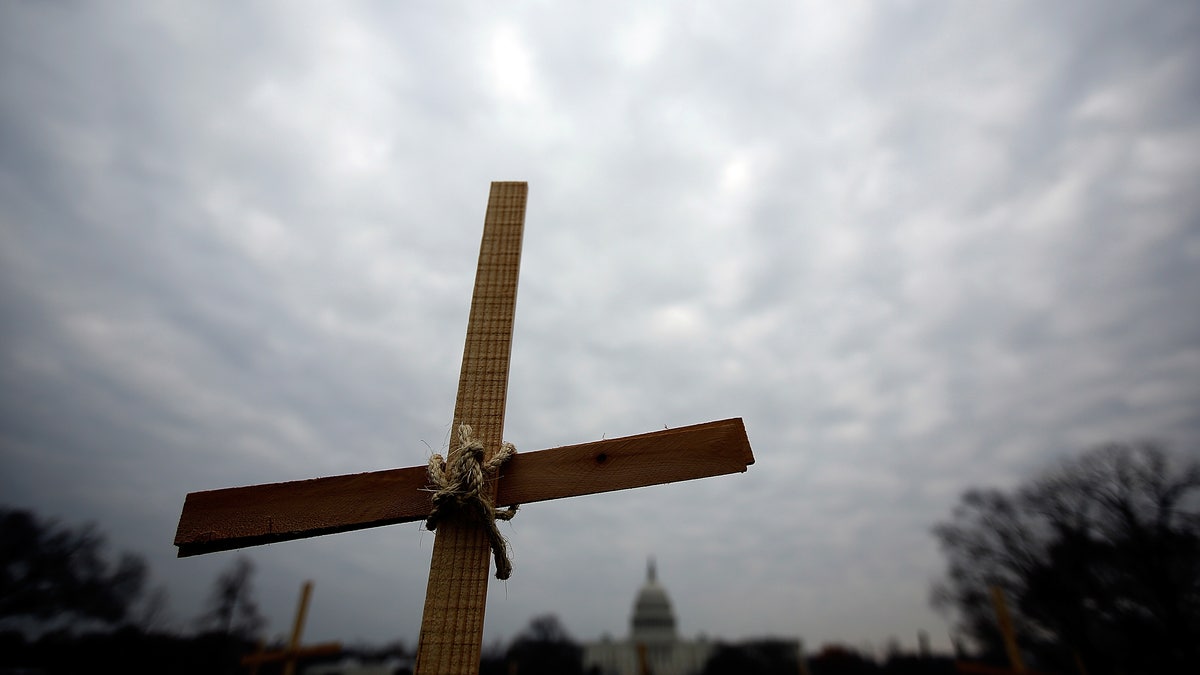
WASHINGTON, DC - DECEMBER 02: Crosses representing immigrants who have died while trying to cross into the United States are displayed after being placed near the U.S. Capitol by the Fast for Families movement December 2, 2013 in Washington, DC. The advocates for immigration reform entered their 21st day of fasting today as they continue to urge U.S. Speaker of the House John Boehner to schedule a vote on immigration reform. (Photo by Win McNamee/Getty Images) (2013 Getty Images)
In the biblical story, a young Jewish woman named Esther learns that her people are at risk as a result of an unjust law. Recognizing that God has entrusted her with a unique level of influence, Esther resolves to go before the king and plead for her people. Before she does, though, she decides to fast – to abstain from eating and focus on prayer, entrusting her situation and that of her people to God – and she urges all of the Jewish people to join in.
Hispanic evangelicals in the United States are at a similar threshold. Our dysfunctional immigration system divides families, limits the ability of many to thrive economically and contribute fully to this great nation, and mocks the principles of the rule of law on which our country was founded. As a pastor, I see the impacts of this dysfunction on a regular basis.
Our fasting serves to emphasize the urgency of our prayers and of our pleas to Congress: This is not an issue to push off to another election cycle or for a politically convenient time.
That’s why I am joining others, of many faiths, in the “Fast for Families” on the National Mall in Washington, D.C. I began my fast Nov. 4. Since then I have subsisted on clear liquids. At times my body is weak, but my spirit is ever stronger.
Like our white evangelical brethren, Hispanic evangelicals are strongly conservative on many traditional family issues, including life and marriage. But many Hispanic evangelicals have felt unwelcome in the Republican Party as a result of some Republicans’ rhetoric and positions on immigration policy.
Because Hispanics are a quickly growing swing voting bloc, both parties seek our attention. As the president of the nation’s largest association of Hispanic evangelicals, the National Hispanic Christian Leadership Conference, I frequently find myself in a position to bring the concerns of our community – 7.5 million strong and growing rapidly – to those in positions of authority. I’ve been entrusted with the responsibility to plea for my people before the governmental authorities who can reform an unjust, dysfunctional system.
That’s why, inspired by the example of the biblical heroine Esther, I have felt compelled to fast as I continue to pray for our elected officials, and to encourage others to join me. Immigration reform is past due, and every day that goes by without reform means another 1,100 individuals are deported. Many of whom are upstanding members of our congregations who have never been convicted of any offense and who, too often, leave behind U.S. citizen spouses or children.
We see the devastation of families divided week after week in our churches. Our fasting serves to emphasize the urgency of our prayers and of our pleas to Congress: This is not an issue to push off to another election cycle or for a politically convenient time. It is the right thing to do, now is the right time to do it, and you have our support.
I’m grateful that tens of thousands of evangelical Christians – not just Hispanics, but our brothers and sisters of every ethnicity that make up this beautifully diverse nation – have joined us in praying for immigration reform and for our elected officials through the Pray for Reform campaign of the Evangelical Immigration Table. More than 180,000 individuals have gone online or have filled out commitment cards in church services, promising to pray, as Scripture instructs us, for those in authority over us. We will continue praying, and advocating, until Congress acts.
I already see God answering our prayers in remarkable ways. For example, an unprecedented coalition of evangelical leaders have joined their voices in a call for reform that is consistent with biblical principles, including executives of nearly every major evangelical denomination, presidents of Christian colleges and seminaries, leaders of parachurch ministries, and pastors of some of the largest and most influential churches in our country.
Polls now show that the majority of evangelical pastors and three quarters of evangelicals “in the pews” support reforms consistent with the principles we have laid out, including an earned process by which aspiring Americans in our communities could get right with the law and eventually earn the chance to become U.S. citizens. The church is unifying in ways I’ve never seen to stand for just, compassionate, common sense reforms to our laws.
Congress has a strong role model in the evangelical church, which has bridged political, denominational, ethnic and geographic differences to find common ground on the question of immigration reform. Until Congress moves forward, I’m taking my cue from Esther and committing to fasting and prayer, pleading with God to give those in authority the wisdom and courage necessary to do what is right.
